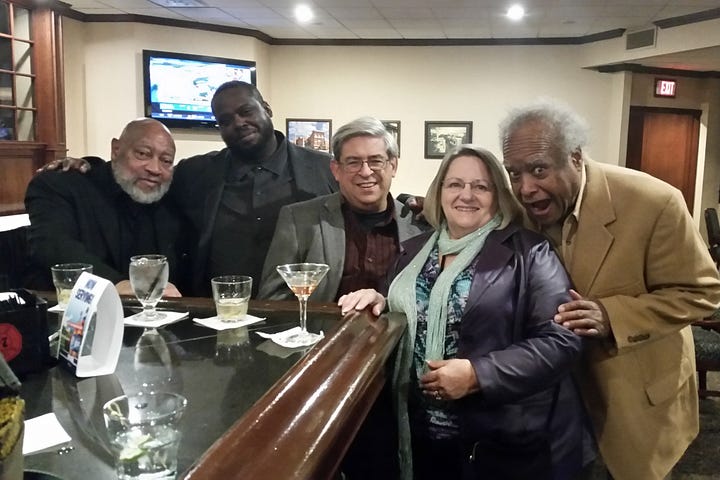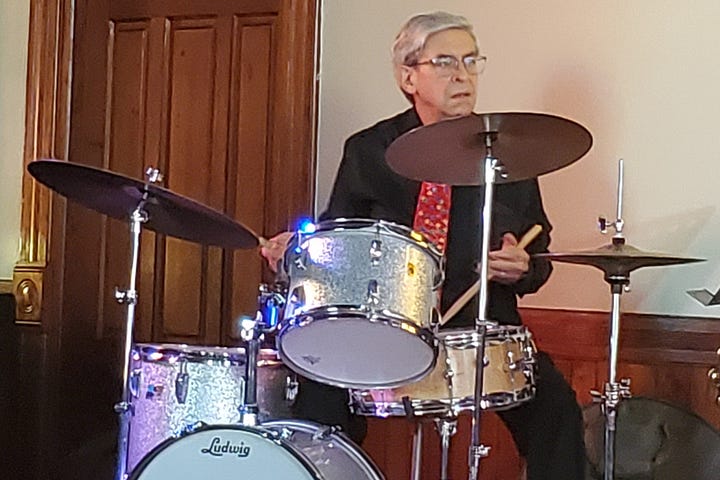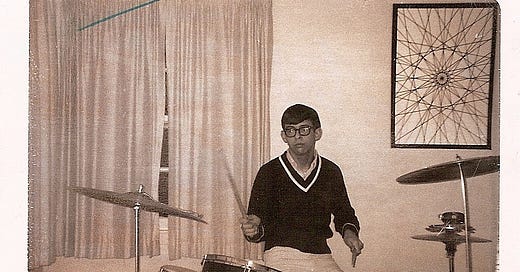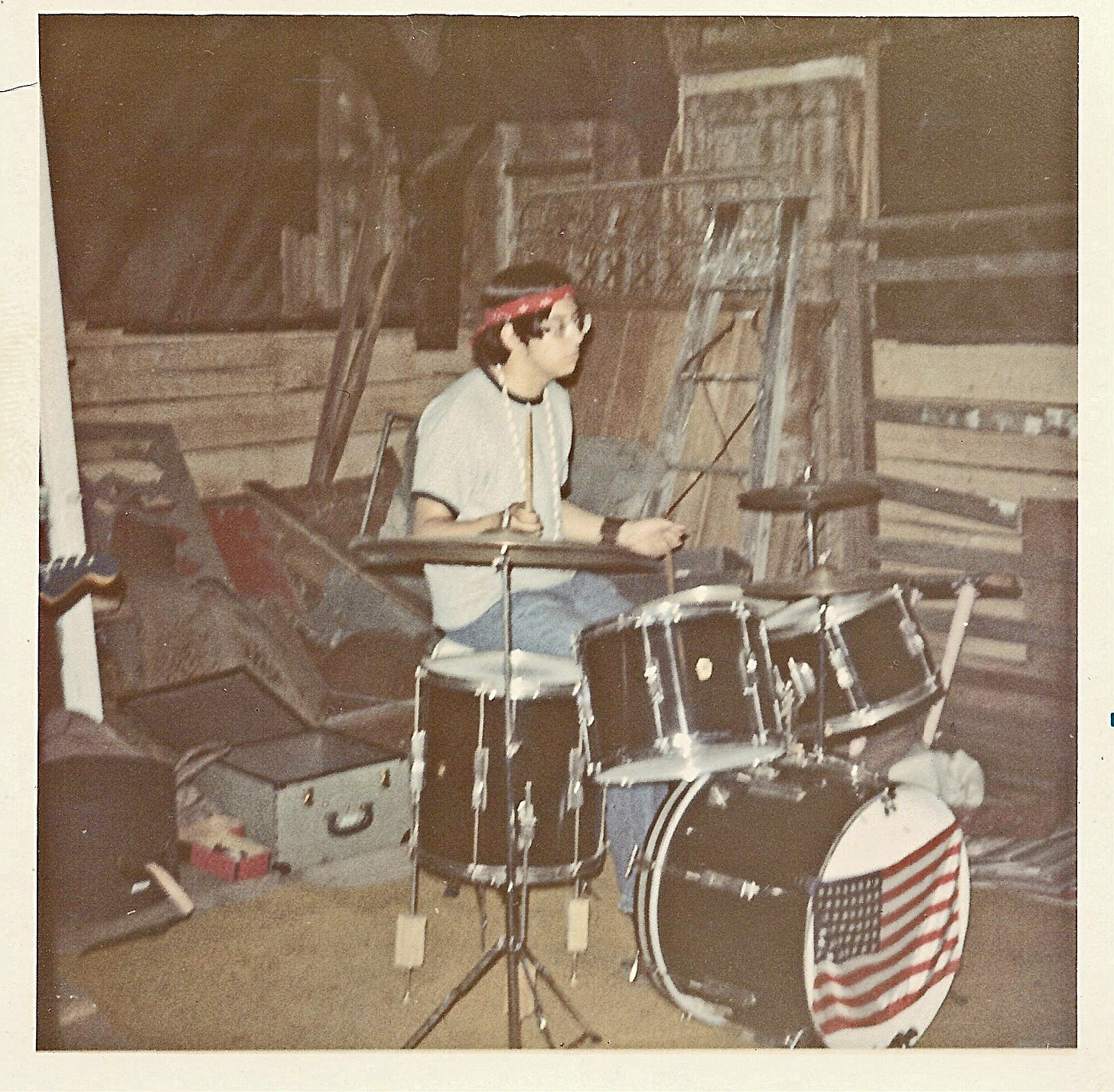For Father’s Day, it’s time for me to recognize and thank the most important musical influence in my life, my father, drummer Vince Sperrazza.
Beyond simply needing to say thank you1, my Dad’s musical life belongs on this Substack: he is as much a product of the African American musical diaspora, powered by the drumset, as anyone I’ve written about. His story is typical, in the best sense; we all know someone just like my father.
The details of Vince’s musical life are quintessentially American, but the broader strokes— family, life, and passing it on— are just about universal. This is a personal thank you to Vince specifically, and a thank you to the Vinces of the world.
Here’s his story:
Vincent F. Sperrazza, Jr. was born in Buffalo, NY in 1951, the first child of Jim2 Sperrazza, a carpenter, and Gloria Sperrazza, a schoolteacher and piano hobbyist. Both were music lovers. Vince grew up with the piano and the radio as the sounds of the house. He became enchanted with the drumset at age 7, when his grandfather, John DiCeasre, a former bandleader and drummer, gave the young Vince his old traps3.
The first thing he learned from DiCesare— Grandpa John— was 4/4 swing with brushes on a snare drum, the same pattern every drummer plays today, the pattern I played on Friday at my gig in Brooklyn with bassist Pete Brendler and pianist Randy Ingram. Grandpa John’s drum lesson progressed to a few rudiments, and ended with an admonishment for professional development: “Listen to Jo Jones to play with a band, listen to Gene Krupa for solos.” Incredible.
It was jazz and pop music that Vince was aware of first— Grandpa John’s absolute favorite (I’m told) was Louis Armstrong, while Jim and Gloria listened to Duke Ellington and Joe Williams with Count Basie, and especially Broadway musicals.
Like most kids his age, Vince noticed rock and roll creeping in around the edges. And then, of course, came February 1964: the Beatles played on the Ed Sullivan Show.
When Ringo and the Beatles happened, Vince, like millions his age, could finally imagine a form for his musical interests. His first drumset, a ’65 Ludwig Club Date, purchased from Castiglia’s Music in Hamburg, NY4, arrived for his 14th birthday, and of course he still has it. This was the era of teen clubs; and Vince’s first band, The Maze, jangled and jingled through tiny amps for a season or two at youth dances.
As exciting and meaningful as the Beatles moment was to Vince, it was never the whole story. For one thing, music was a profession to the Sperrazzas, a chance to work and make money. When he was 17 and could legally drive at night, Vince was gainfully employed by a local saxophonist (Angelo Cellini), playing weddings and parties in the Italian and Polish communities in Greater Buffalo in an accordion/saxophone/drums trio, earning, as he often told me, three or four times on a weekend of gigs what his buddies with part-time jobs earned in a week.
My grandmother once mentioned that my Dad essentially paid his way through college with music. Arriving at SUNY Geneseo as a bio major in the fall of 1969, he maintained his studies while playing as and when he could, a pattern he kept for his entire working life. Karen arrived on the scene in the summer of 1970, when Vince was in a racially-mixed band playing Cream and 5th Dimension in the Southern Tier of NY State, on the same circuit that Ronnie Dio (as my Dad calls him) was then playing.
Vince and Karen got married in 1973 and moved to Utica, NY, when they both found jobs in the area; my Dad taught middle school science in rural Herkimer County for the next 33 years, while my Mom, a school librarian, worked in Rome, NY.
New to town, Vince gradually found some musical outlets, different leans on rock music with local bands. There was occasionally an original song or two, but mostly it was playing covers and hits on weekends, satisfying the need to play and bringing in some extra money; after all, by 1982, he and Karen had two little kids, Vincent (yours truly) and Joe, to look after. His band at the time was one of the best in the area, but by 1988, with their third son, my brother Mark, newly arrived, the grind of the local bar band scene combined with the demands of being a full-time teacher and father of three meant something had to change. The guys in the band moved away, and Vince set aside rock music.
Somewhere in there, he became a jazz guy. Just down the road from us was the Newport Jazz Festival at Saratoga (as it was then called), and he began taking us to the festival every summer, plus whatever jazz we could see close to home. To me, this was a new development, but to Vince, this was going back home. Jazz was in his family, a part of his life since earliest childhood5. The house filled up with jazz CDs and videos (Charlie Parker, Art Blakey, Miles Davis, Thelonious Monk), and his ever-present love of the music was infectious. I was deeply infected.
In 1991, Vince joined the Tuesday Night Big Band, comprised of local music teachers and enthusiasts who play “Sentimental Journey”, “Take The A Train”, “One O Clock Jump”, and the like at parks and nursing homes through the spring and summer; I heard this band often when growing up, and they’ve become a true institution in the Mohawk Valley, part of the fabric of the community. This is the center of my Dad’s musical life, his longest-lasting musical community.
After he retired from teaching, he had a fruitful 10-year run with VS Custom Drums, building customer-ordered sets from Keller shells6 , occasionally buying and selling drums, and healing the abused kits of Greater Utica. He still practices every day, listens to music all day long, and he and Karen go to every show they can, including some of mine, always a special occasion. Nothing like your teacher in the audience to make you really play.


Of course, he was my first drum teacher. Drum lessons were focussed on learning to read music— a necessity if I wanted to work, and I love that working was always a part of the discussion— and then on playing with records. It was a joy. I was about 12 years old when my Dad gave me the single most useful advice I’ve ever received: After an intro or solo, play a fill to set up the singer. A simple fill, right before the singer comes in, makes musical sense and helps the singer; if you do that, you’ll probably get called again for the gig7.
Through his whole adult life, the drums and music were never how he put food on the table. Music was, instead, the reason to live, the thing he actually did. At his teaching job, being a drummer was almost like a secret identity, one he would hint at to get a reaction from his beloved students; at home, drumming and music was a source of happiness, the main ingredient, the thing for our family to share and participate in.
This is Vince— the more it changes, the more he stays the same. This is how the music is learned, this is how the story goes on and on; the Vinces of the world share the music with anyone.
There are so many musicians like my father out there; where would we be without them? These are the people who pass it on, as important and vital as a famous player or legendary teacher, if not more so; the Vince Sperrazzas of the world are, in a very real way, the lifeblood of the music.
Everything I’ve done, musically, comes from my Dad and my family. I am one lucky so-and-so; I stole his whole vibe. My entire musical life is just an attempt to stay in the zone that he showed me— at the drums, at peace, with love in his heart for all the drummers, all the players, all the listeners, and the family.
Thank you Vince, thank you Dad, thank you all!
It’s really not fair to recognize Vince and not recognize his wife, my mother Karen; she is just as musically sophisticated as he is, if not more so; she has the keener ear and the greater sense of a musician’s intention; nothing gets past her. But it’s Father’s Day, and it’s time to do this.
My grandfather’s name was Vincent F. Sperrazza; ‘Jim’ was apparently an American English pronunciation of a typical Sicilian nickname for Vincent. He and his wife were Jim and Glory, that’s all I know.
John DiCeasre worked as a bandleader and drummer in Buffalo from 1929 until 1941, when the construction industry— his industry— was in rapid contraction due to the Great Depression, which started in 1929. He called himself “Johnny Joylander”; my father has his scrapbook and most of his drumset; in the Eighties, my father met a Buffalo native who remembered hearing the band. John DiCeasre died in 1976, before my time.
Hamburg is a Buffalo suburb, where my father mostly grew up, in a house his father built!
To illustrate the point: Vince was always welcome to play whatever record he wanted to play on his parent’s hi-fi. At home from college, during a visit from his Grandpa John, he put on Derek and the Dominos Layla. When “Nobody Knows You When You’re Down And Out”, John laughed and said “I used to play this song!”.
I have a gorgeous 6 and 1/2 rosewood snare drum we designed together.
This is 100% true.






Wow...thank you. That is a Father's Day gift I will always cherish!
very nice acknowledgement of your dad! kudos vinnie.. my dad has been gone for almost 40 years.. he died too young..